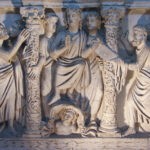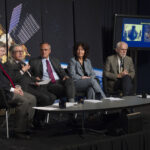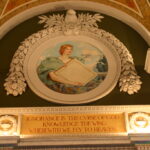Exploring God’s Relationship with Time: Is God Timeless or Temporal?
Introduction: The Profound Question of God’s Relationship with Time
One of the most intriguing philosophical and theological questions is the nature of God’s relationship with time. Is God timeless, existing outside the bounds of time, or does God enter into time and experience it as humans do? This question delves into the nature of God’s existence and whether His interaction with the created world changes His timeless state. In this article, we explore this complex and fascinating topic, building on the insights of philosopher William Lane Craig, who has dedicated years of research to understanding the relationship between God and time.
Is God Timeless or Temporal? The Core Debate
At the heart of the debate lies a fundamental question: Is God outside of time or does He exist within it? Traditionally, many theologians have argued that God is timeless. This view suggests that God exists beyond the constraints of time, unaffected by past, present, or future. God’s eternal nature means that He does not experience time the way we do, with sequential moments flowing one after another.
However, William Lane Craig presents a more nuanced perspective. He argues that God is timeless without creation but became temporal with the creation of the universe. According to Craig, before the existence of time and space, God existed in a state that was timeless. However, once the universe was created, God entered into time and has remained temporal ever since.
This view is both original and controversial. It suggests that God undergoes a form of change—at least in how He relates to time—while maintaining His divine attributes and sovereignty.
God’s Transition from Timelessness to Temporality
One of the most remarkable aspects of Craig’s conclusion is the notion that God experiences a transition from timelessness to temporality. Craig argues that this shift occurred at the moment of creation. Before creation, God existed timelessly, without any relation to time. But with the creation of the universe, time came into existence, and God, in His relationship with the temporal world, entered into time.
The question then arises: Is this transition irreversible? Craig believes it is. Once God enters time through creation, He cannot return to a state of timelessness. This is because time, once it begins, continues indefinitely. God’s knowledge of temporal events and His interaction with a time-bound creation make a return to timelessness logically impossible. Time, in Craig’s view, will exist forever, and God will remain in time alongside it.
How Could Time Begin? The Mystery of Creation
A related issue is how time could have begun if there was no time before creation. How does something that has no temporal existence suddenly initiate the existence of time? This is where philosophical and theological thinking must stretch to accommodate new categories of thought. Craig emphasizes that time had an absolute beginning—a first moment when time came into being. There was no “before” in a temporal sense, because time itself did not exist.
From God’s timeless perspective, Craig argues, the decision to create the universe and initiate time was not a temporal event. God did not “wait” for the right moment to create, as waiting presupposes time. Instead, God, timelessly, brought the universe into existence, and with it, time.
The Nature of God’s Knowledge and Free Will
Another fascinating aspect of this discussion is how God’s knowledge and free will operate in a timeless state. How could God, without being in time, decide to create the universe? This raises the question of whether God’s decision was made freely, or if it was always determined. Craig explains that God’s decision to create the universe was a free act. He posits that God had an eternal determination to create the universe, meaning that God’s decision was timeless and free from external constraints.
Although this decision was free, it was not a temporal process with moments of deliberation. In God’s timeless state, He always knew what He would do, and there was no period of indecision. God’s omniscience ensures that He always knew He would create the universe, and this knowledge was not the result of any temporal foresight.
The Experiential Knowledge of God
Craig’s view also touches on the experiential knowledge of God. After entering time through creation, did God gain new experiences? This question is often compared to the thought experiment involving a colorblind neuroscientist who knows everything about the science of color but has never seen color. When she finally sees red for the first time, does she learn something new? Similarly, when God enters time, does He acquire new knowledge of what it is like to experience temporal events?
Craig believes that God does not gain new propositional knowledge, as God already knows all truths. However, God may gain a kind of experiential knowledge—what it is like to experience time. This does not change God’s essential nature, but it does represent a shift in how God interacts with His creation.
Theological Implications of God’s Relationship with Time
Theological implications of God’s relationship with time are significant. In the Christian tradition, believers hope for eternal life with God. However, does eternal life mean timeless existence, or is it a temporal experience? Craig argues that even if God is now temporal, humans remain temporal creatures. Eternal life, as described in Christian theology, is not a static, timeless existence but rather a dynamic, ongoing experience. This aligns more with the biblical concept of “everlasting life” rather than the Greek philosophical idea of a timeless soul.
Craig’s research also challenges traditional views of divine immutability. While God’s essence remains unchanged, His relationship to time may vary. This does not diminish His omnipotence, omniscience, or omnipresence, but it does present a more complex understanding of how God interacts with a temporal world.
Conclusion: Exploring Time and God’s Eternal Nature
The relationship between God and time is one of the most profound topics in philosophical theology. William Lane Craig’s view that God is timeless before creation and temporal afterward offers a fresh perspective on how we understand divine eternity. It highlights the depth of both God’s sovereignty and His intimate connection with creation.
Craig’s work continues to provoke thought and challenge long-held assumptions. Whether one agrees with his conclusions or not, the dialogue between God and time opens up a rich field of inquiry into both the nature of the divine and the very fabric of time itself.
If you are inspired by this discussion and want to dive deeper, I encourage you to watch the full conversation: here.





